1. The Nourishing Power of Hymns
If you haven’t read this talk by Elder Jay E. Jensen, you have to read it. It’s life-changing. At least it was for me.
The Power of Hymns to Invite the Spirit
Hymns vs. Classical Music
Singing Hymns as Lullabies
Teach your children to love the hymns. Sing them on the Sabbath, in family home evening, during scripture study, at prayer time. Sing as you work, as you play, and as you travel together. Sing hymns as lullabies to build faith and testimony in your young ones.”
Nighttime Rituals
Right along with that, this talk also sparked in me the desire to make nighttime rituals an important part of my family life. It gave me a desire to sing my children to sleep, or at least bring hymns in as a fundamental part of their bedtime routine. When I was a little girl, my mom would rock me on her lap and sing to me. I also remember my dad standing next to my top-bunk bed singing “Abide with me” at night before I went to sleep. I don’t remember how young I was or for how long that that routine lasted, but it definitely created a lasting memory. I remember when the twins (my two youngest sisters) were growing up, my sister Lisa would often volunteer to go in and sing them to sleep. Sometimes I would join in, but most of the time I’d just go to bed – busy with other things, school, etc. But now I kind of regret not doing that more often. The twins (now 14) remember those nightly rituals with fondness. Back then it really didn’t seem like a big deal. They were so little it didn’t seem like they’d even remember those bedtime rituals or that it would even make a difference if I opted out of participating. Anyways, it just made me want to not miss out on those kinds of opportunities with my own children. This talk reinforced my desire to make those bedtime rituals a priority.
Memorizing the Hymns
On my Mission
Musical Callings
A Way of Life
I’m grateful to have married someone who loves singing hymns. I remember when we were first getting to know each other, I thought it was neat how Alex would gather friends together to sing hymns. He also loved playing the hymns on the piano and he took his calling as a ward choir director very seriously. Alex loves to sing songs that invite the spirit. Because of the type of person he is, it’s felt pretty natural to incorporate the singing of hymns into our lifestyle and make it an frequent and fundamental part of family life. I’m grateful for that.
2. The Lord’s Way
One thing we have often been taught is to bloom where we are planted. Yet sometimes we are tempted to migrate to some new area, thinking our children will have more friends and therefore better youth programs.
Brothers and sisters, do we really think the critical factor in the salvation of our children is the neighborhood where we live? The apostles and prophets have often taught that what happens inside the home is far more important than what our children encounter outside. How we raise our children is more important than where we raise them.
Certainly there are other factors involved in deciding where to live, and thankfully, the Lord will guide us if we seek His confirmation.
Another question is “Where are we needed?” For 16 years I served in the presidency of the Houston Texas North Stake. Many moved to our area during those years. We would often receive a phone call announcing someone moving in and asking which was the best ward. Only once in 16 years did I receive a call asking, “Which ward needs a good family? Where can we help?”
In the early years of the Church, President Brigham Young and others would call members to go to a certain place to build up the Church there. The irony is that even now we have faithful Church members everywhere who would go anywhere the prophet asked them to go. Do we really expect President Monson to individually tell more than 14 million of us where our family is needed? The Lord’s way is that we hearken to our leaders’ teachings, understand correct principles, and govern ourselves.”
Thinking Back to the Castle Valley Pageant
I think a major reason why this talk had such a profound impact on me was because I had recently gone to see the Castle Valley pageant with some high school friends. It was my first time ever visiting Castle Valley, and as we drove out there, I have to admit, I didn’t really like it. Castle Valley just seemed like a desolate desert. I felt a little like Lehi in the wilderness. We drove and drove, and I remember coming to the outside amphitheater where the pageant was held. It was literally smack dab in the middle of nowhere – desert and sagebrush on all sides. And I remember thinking how Castle Valley is probably the last place I’d ever want to live.
Well, come to find out–the theme of the pageant actually touched on that very thing. It was a story of a family from Mount Pleasant, Utah (which happens to be my hometown, so this hit home even more for me!) who were called by the prophet to go settle and build up the church in Castle Valley. Some members of the family protested and didn’t want to go. They had just built their homes in Mount Pleasant. They were comfortable there. That’s where their extended family was (and back then I imagine it was probably a lot harder to keep connected with family if you lived far away). But the pageant told of their journey of faith and how they accepted their call from the prophet to go and settle in Castle Valley.
I’ll Go Where You Want Me to Go
So, in light of that, this conference talk made me realize that the principle of going where He wants you to go is still a true principle (which perhaps nowadays we don’t consider as seriously as we should when deciding where to settle down with our families). I had always been one to want to live in a really good neighborhood with a really good ward. So this got me thinking. Maybe even if we do seek direction for where we should live, perhaps we limit the revelation we might receive because of our own preconceived conditions that we’ve already set in stone. (i.e. As long as it’s one of the options we’ve already chosen. As long as it’s where we can get a good job and where there will be “good opportunities.” Or, as long as it’s close to family, etc.) Of course, those are all important factors. But–setting all that aside–what if the Lord told me I was needed in Castle Valley? Would I be willing to go, without question, no matter the sacrifice? Or would I cling to my own preferences and opinions of what would be best for my future and my family? Honestly, I’ll admit that it would be reeeeeeally hard for me to drop everything I go somewhere like that, so I’m not saying I’d be the perfect example of this. It would definitely take a lot of faith.
The Law of Sacrifice
Elder Ellis’ remarks made me think about how this is part of the law of sacrifice. He reminded us that just because President Monson isn’t going to individually tell each of us where to live, doesn’t mean we shouldn’t still govern ourselves by that very same principle. The only difference is that we need to be the ones to actively seek out that revelation for ourselves, just like Lehi did for his family when he was inspired to leave Jerusalem and go journey into the wilderness, leaving behind all their gold and silver. Thinking about this has made me more willing to go wherever Heavenly Father wants us to go. Rather than basing where I end up on whether or not it’s a “good neighborhood,” I realized the great importance of seeking direct personal revelation to guide our moving decisions.
Building up the Kingdom
This talk also made me realize that my main goal in everything I do should be to build up the kingdom of God. I realized that it is selfish to think only of my own comfort and have the mindset of “what’s in it for me and family?” when deciding where to settle down. I should also be focused on how I can help the work to progress and where my influence might be needed the most.
Faith in the Lord
Also, one idea I had — Perhaps basing where I live solely on its visible “opportunities” shows a lack of faith. Heavenly Father can make more out of our lives than we can. Because, really, if Heavenly Father wanted me to live in a certain place, then certainly He would provide even better opportunities there for my family and children than I could ever find somewhere else on my own. He’d put the right people in our lives, line up certain things just right, or bless us with unexpected tender mercies, etc. These trump any benefits we try to get by relying on our own knowledge to seek out “better youth programs” and “better neighborhoods.”
I once remember one of my uncles commenting on how, when his family was relocating to Salt Lake City, several people advised him to avoid certain “sketchy neighborhoods” in the area. But they ended up moving into one of those neighborhoods and met some of the most down-to-earth people there and had a really positive experience. I guess it’s not where we live. It’s how we live. It’s how we raise our family that matters. Blessings will flow when we’re willing to sacrifice to go where the Lord wants us to go. This was a humbling message for me.
3. Nothing Shall Offend Them
This was a very empowering talk. I felt empowered when I first heard it, and every time I think back to it and try to apply it, I feel empowered. I like how Elder Bednar uses the phrase “triumph over offense.” From this talk I learned about the huge role of our own free agency in choosing to be offended. It also made me realize how free and peaceful life can be when we choose not to take offense.
And just because that excerpt of the talk is so good, I’m going to include it here:
When we believe or say we have been offended, we usually mean we feel insulted, mistreated, snubbed, or disrespected. And certainly clumsy, embarrassing, unprincipled, and mean-spirited things do occur in our interactions with other people that would allow us to take offense. However, it ultimately is impossible for another person to offend you or to offend me. Indeed, believing that another person offended us is fundamentally false. To be offended is a choice we make; it is not a condition inflicted or imposed upon us by someone or something else. . .Through the strengthening power of the Atonement of Jesus Christ, you and I can be blessed to avoid and triumph over offense.”
One of the Purposes of Attending Church
Not Making a Big Deal over Little Things
What are some general conference talks that have changed your life?
I’d love to hear about them.


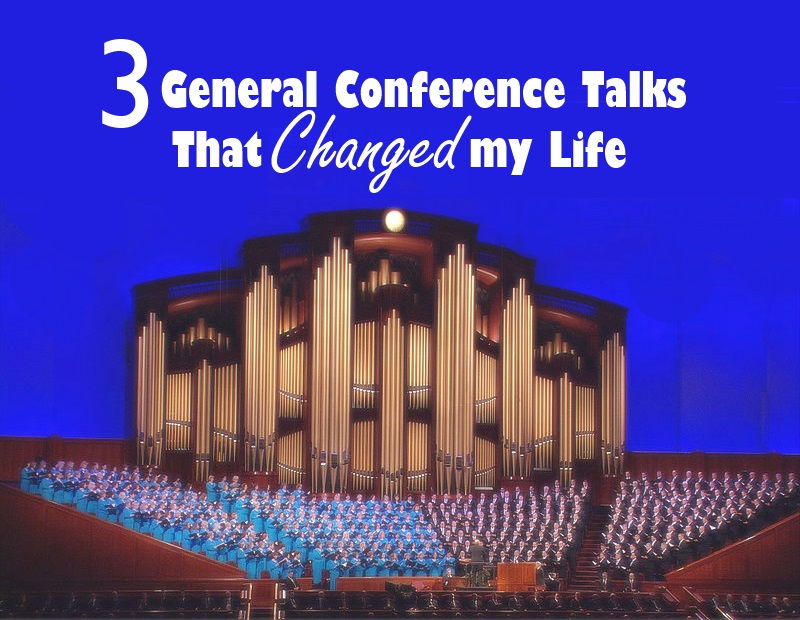
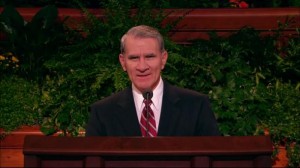


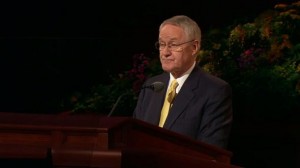
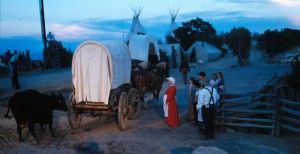


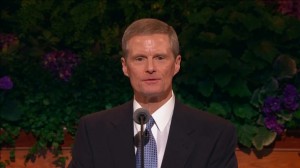


6 pings